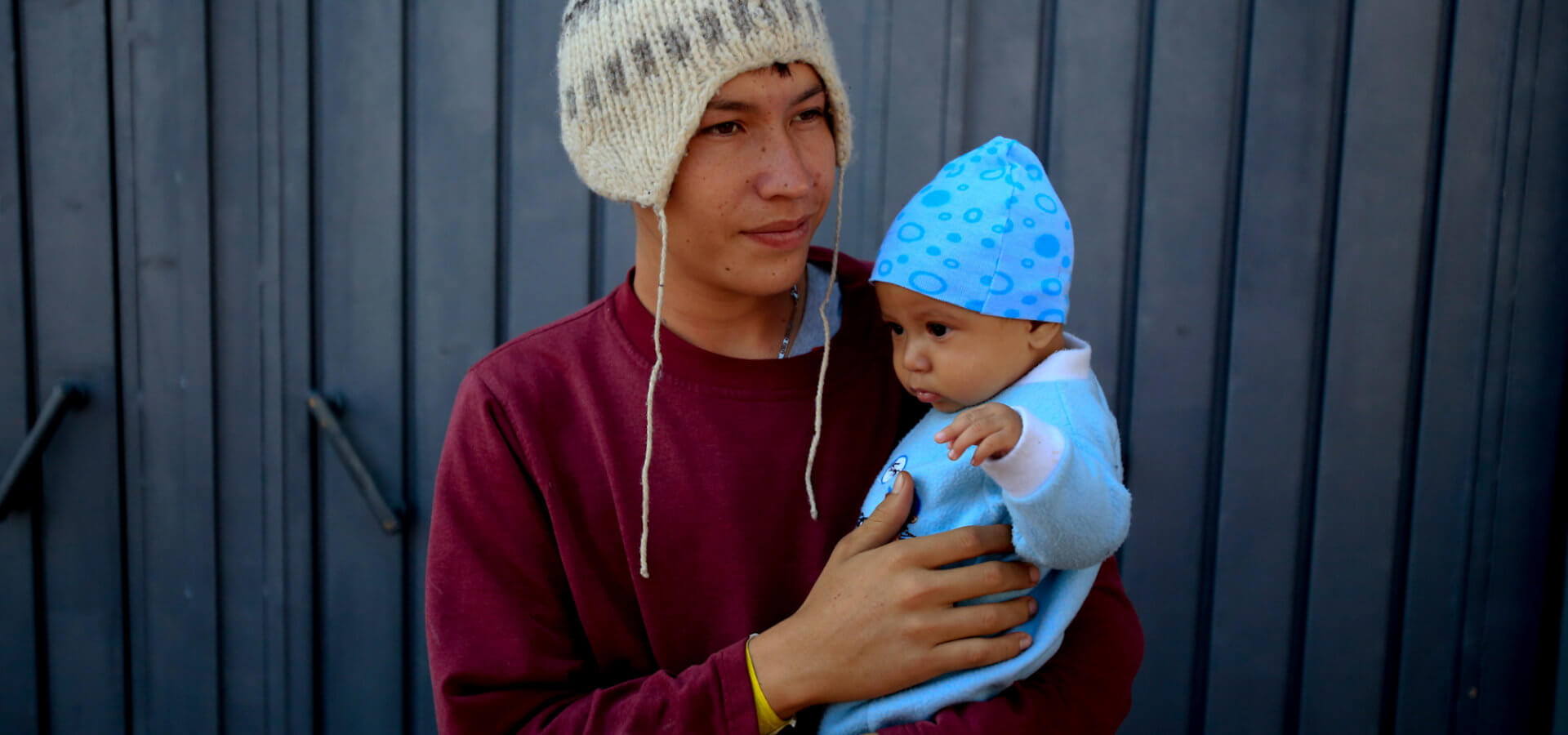MEXICO CITY, MEXICO – Over the past week, Mexico’s sprawling capital has been transformed into the flashpoint of a global humanitarian crisis of forced migration that is rearing its head in all parts of the globe.
The crisis, whose latest focal point is the migrant caravan from Honduras, as well as smaller caravans from Guatemala and El Salvador, has cast a sharp light on the hypocrisy of regional and global authorities while calling into question the viability of a global system governed by military force, punitive immigration management systems, and the needs of transnational corporations.
In what has universally been described as a “refugee exodus” by asylum-seekers and civil society alike, thousands of Central Americans have found temporary shelter in the Jesus Martinez “Palillo” football stadium, where many are enjoying a temporary respite before continuing their treacherous – and frequently deadly – journey to the North.
The most recent so-called “migrant caravan” has been ongoing for several years and is simply the latest manifestation of a broader and more dispersed exodus of families fleeing state violence, criminal threats, and economic desperation.
Among other reasons, the refugees, migrants, and asylum-seekers now hope that they can find strength in numbers and in a rudimentary form of organization – general assemblies and votes held nightly – that would allow them to ward off the threats of state persecution and abductions by criminal gangs who kidnap and often traffic captured migrants, collectively discuss problems and cope with the various hardships encountered in unknown and often hostile territory.
In Mexico City, the caravan was able to find some hospitality: donations from across the country poured in, comprised of clothing, medicine, toiletries, and toys for children. Peppered among the thousands of refugees were hundreds of social service workers in pink vests from the municipal government, aid workers from United Nations children’s agency UNICEF and Cruz Roja (Red Cross), as well as staff and tents from Oxfam and the municipal government where caravan members can bathe, eat a hot meal, and have their medical needs attended to.
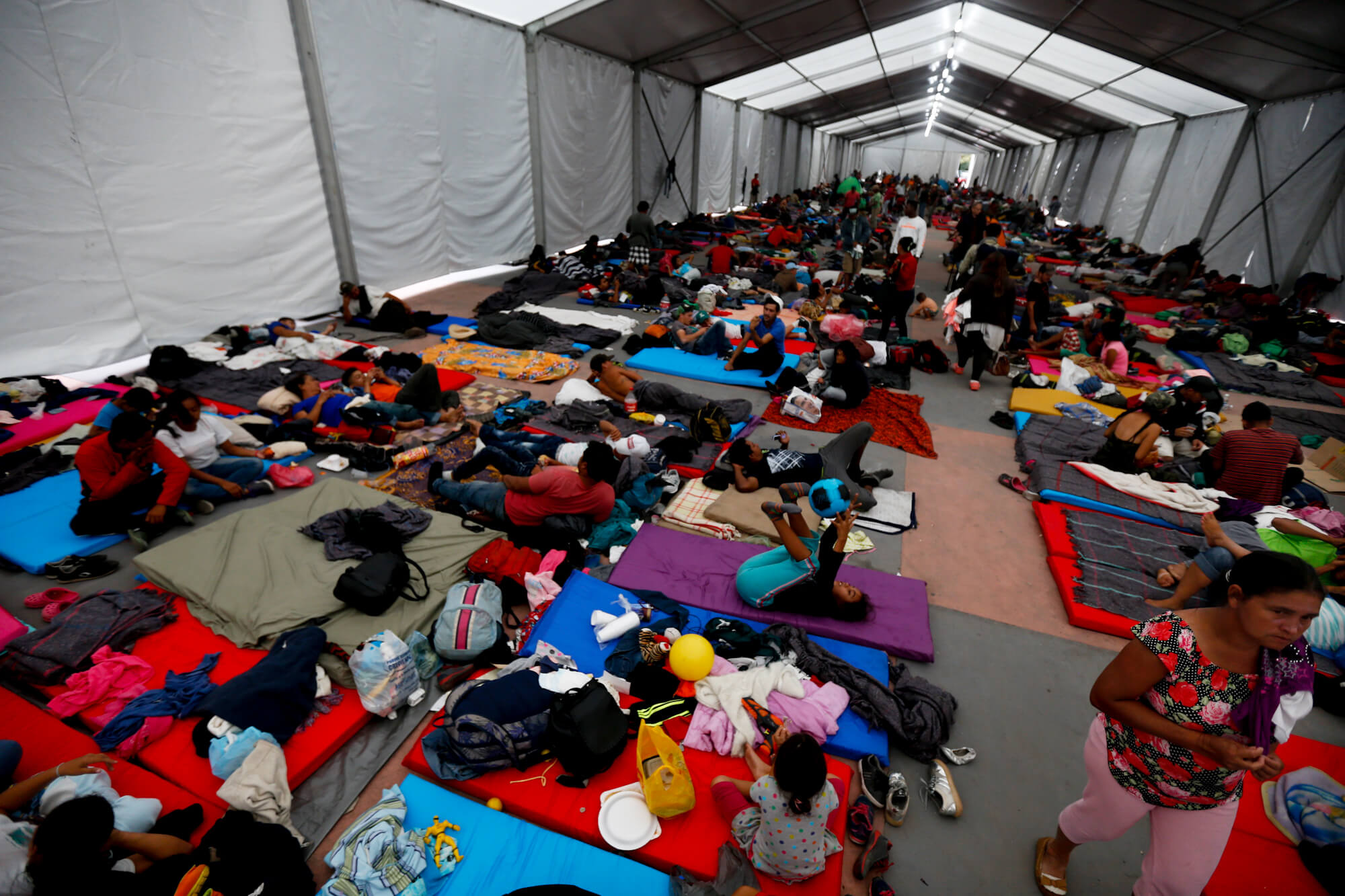
Yet on Wednesday evening, only ten lawyers were on hand to answer the important legal questions relevant to every migrant present, and to inform them of the dangers of crossing into the U.S. – where they could face arbitrary, prolonged detention or be separated from their families – as well as the danger of relying on the oft-broken promises of a Mexican government riddled with head to toe with various forms of corruption.
MintPress News spoke to an asylum-seeker from Honduras who identified himself as Franklin. A deportee who once lived in a working-class neighborhood along Church Avenue in Fresno, California, Franklin held various jobs in the city while providing for his wife and two kids, until he was detained by Immigration and Customs Enforcement (ICE) in 2017 and locked up in ICE’s Atlanta City Ice Detention Center in Georgia.
“I was taken by ICE with my wife, they put me in the jail for five or six months,” he explained. “I want to go back to California, I am here with my family and want to work.”
In Honduras, we have no jobs, no nothing. I don’t like the government [of U.S.-backed President Juan Orlando Hernandez] – too much corruption, too much bad government.”
Franklin seemed unaware of the scaremongering hype over the migrant caravan or “invasion” that the Trump administration and Republican Party had sought – rather unsuccessfully – to cynically use to sway voters prior to Tuesday’s midterm elections. He also appeared unaware of the thousands of troops the White House has deployed to the southern border, or other draconian measures meant to discourage the caravan from continuing its journey.
The border – how is it? Is it open? Are they letting people, families through?”
Advocates, organizers converge for World Social Forum on Migration
The caravans’ arrival to Ciudad Monstruo or “Monster City,” as locals call it, coincided with last Friday’s opening of the 8th World Social Forum on Migration (WSFM), held in the working-class neighborhood of Tlatelolco, located in the central borough of Cuauhtémoc.
Hundreds of academics, NGOs, grassroots organizations, workers’ associations, and advocates from across the globe participated in the conference, which was held under the slogan “Migrate, Resist, Build and Transform” and organized along eight themes or “thematic axes.”
Groups including the mothers of disappeared children, Moroccans deported from Algeria, stateless Palestinians seeking their right to return to ancestral lands, and domestic workers from Texas shared their experiences and perspectives in the hopes of finding a common strategic response that could address the growing crisis of forced migration, as well as the systemic exploitation and abuse of immigrants across the globe.
Given the clear urgency of the situation, the forum went beyond simple discussion and reflection alone. Various participants voiced their annoyance at the tendency within migrant justice circles to repeat sentiments that immigrants, migrants, and refugees are victimized, or that everyone should have a right to work. Many had long ago reached the conclusion that timid demands centered on human rights or the “right to migrate” were, taken on their own, insufficient way to address the dire crises of dispossession, displacement, and forced migration.
Instead, groups underscored and shared tactics that had proven successful in their own struggles while striving toward reaching a common strategy.
Bernadette Ellorin, the New York-based national spokesperson of Filipino organization BAYAN-USA, told MintPress News.:
This year it had become a space where people could produce declarations of action and manifestos, [and] there have been actual efforts to come out with action resolutions out of the forum. That has always been the challenge — to maximize these types of spaces for action.”
Recognizing the need for a collective, action-oriented approach, ten years ago Bernadette’s organization and like-minded groups formed the far more outspoken and militant International Migrants Alliance (IMA).
From Monday through Wednesday, the alliance held their fourth general assembly in Mexico City’s Colonia Tabacalera, often referred to as “Little Los Angeles” due to a large number of newly-arrived U.S. deportees who have made the neighborhood their home.
The International Migrants Alliance (IMA): “fight capitalist exploitation, plunder and war!”
The International Migrants Alliance describes itself as the “first-ever global alliance of migrants, refugees, displaced peoples, and their families.” IMA makes no apologies for its radical socialist perspective, and held its general assembly under the slogan:
Migrants, refugees, and peoples of the world unite and fight capitalist exploitation, plunder and war! Forge the strongest solidarity with the host people in effectively fighting imperialism!”
With 140 member organizations from across the globe, the alliance’s diversity of membership was graphically on display at the general assembly through the flags, flyers and posters representing workers’ unions, student organizations and other mass movements across the globe.
While much of IMA’s membership reflects its roots in the militant leftist Philippine and Asia Pacific diaspora, those present for the assembly included organizations representing communities from Africa, Palestine, Central America, Ecuador, Peru, Mexico, Turkey, South Asia, Korea, Hong Kong, the U.S. and Canada.
Various sectors of the global immigrant community were also represented, including refugee centers for uprooted people, marriage migrants, interfaith organizations as well as militant domestic worker and U.S. guestworker groups.
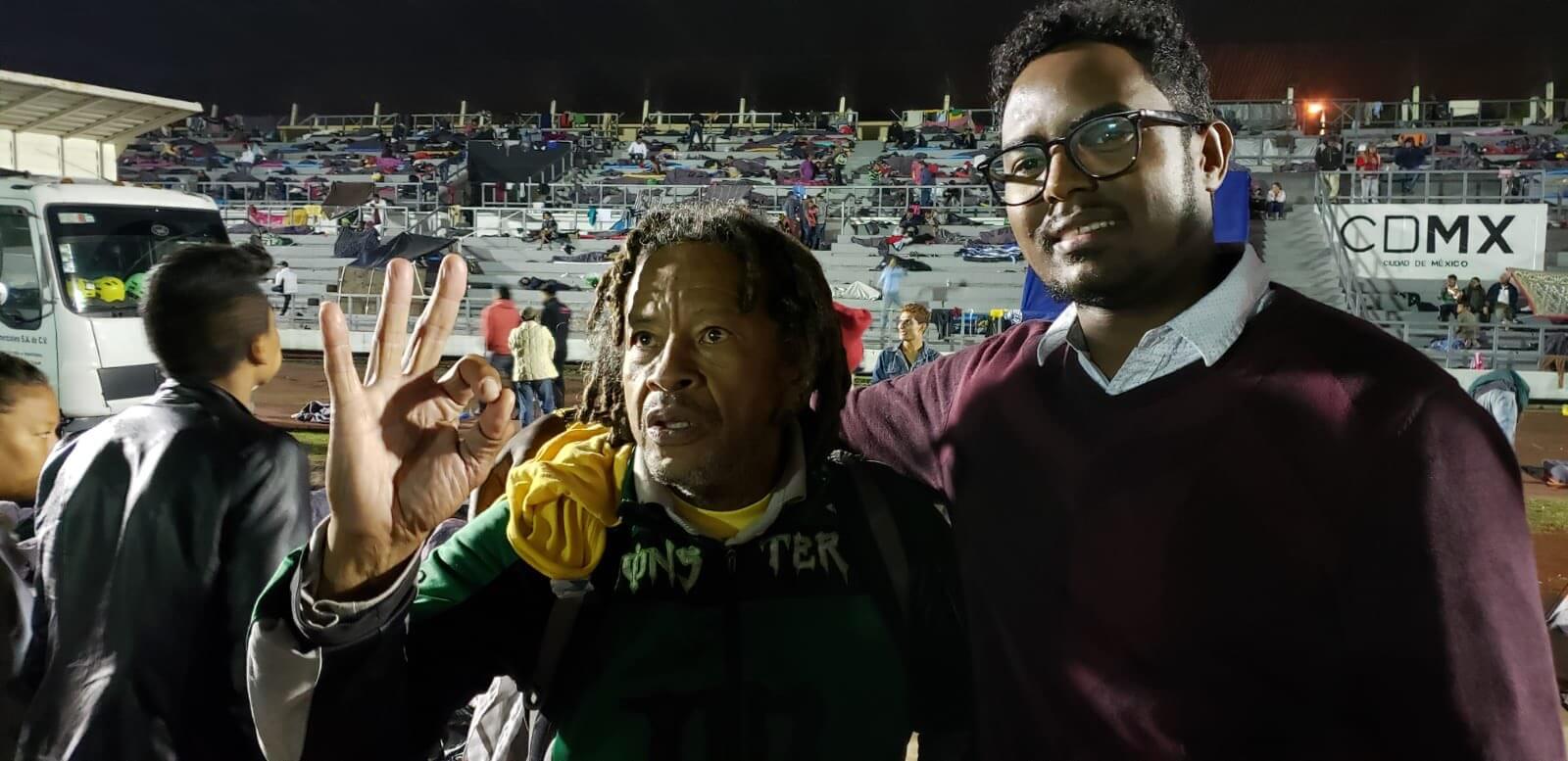
IMA has grown stronger and more representative over the years due to it being a force outside of the nonprofit industrial complex or the grant-dependent NGO world that usually comprises civil society, Ellorin explained:
Many people thought that IMA wouldn’t last precisely because it’s grassroots and it doesn’t have money or resources. These are poor members and poor organizations that don’t have access to a lot of opportunities like recognition in big multilateral formats like the United Nations, for example, that other more well-funded non-profits do.
The reason why IMA has survived for ten years and more is because it has never relied on it being well-funded to exist, it has relied on the mass movement to exist; on the struggle of the poor to resist, on the struggle of the poor to organize, self-organize and be self-reliant. This has been our source of strength and of our ability to survive and last this long: on the strength of the mass movement.”
The alliance focuses on building such a mass movement and leadership based on poor people for the simple reason that only a group guided and led by the affected communities can tackle the root causes of forced migration.
Among various participants and organizations represented at the IMA general assembly, three causes of the migrant and refugee crisis were repeatedly identified: capitalism, imperialism, and neoliberalism.
Steven Osuna, a founding organizer of the Los Angeles-based Human Rights Alliance for Child Refugees and Families, explained to MintPress News that these causes of the crisis are rarely addressed in the media when discussing the present caravan or the previous waves of unaccompanied youth who faced prolonged detention and deportation under the administration of President Barack Obama.
For his group, the need to uplift the voices of migrants must also be paired with a critical analysis of what the systemic economic crisis propelling the perpetual northward exodus from the Global South — the need for the wealthy to further squeeze wealth from the world’s poor.
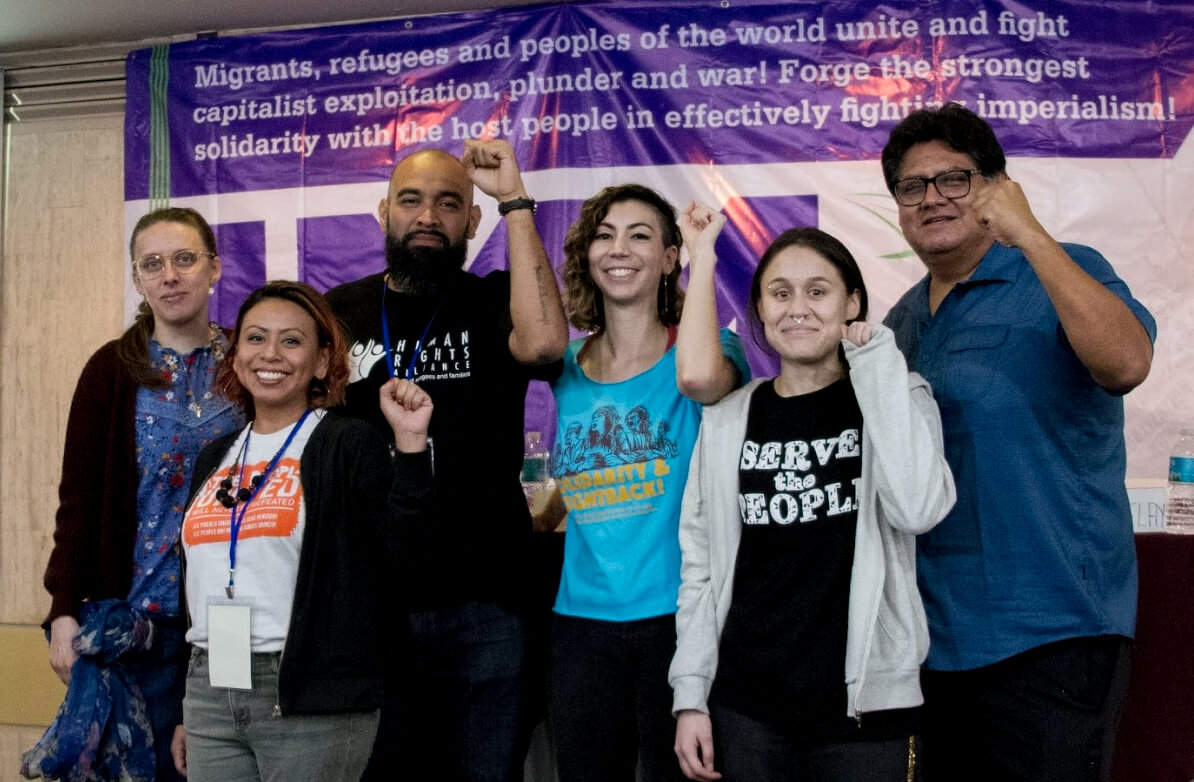
“Capitalist crisis places private property over human rights, it prioritizes the interests of corporations and the owners of industry over the interests of the people who work for these industries, or over those who need work – it places the interests of the wealthy over the poor and displaced, who really need support in these countries,” Osuna noted.
Continuing, he explained:
U.S. foreign and economic policies are the root, but fundamentally it’s U.S. imperialism and the world capitalist crisis that is being manifested through neoliberal policies that have resulted in these huge exoduses leaving from Honduras, Guatemala and El Salvador – this surplus population of people who are not benefiting from this system.
People are simply looking for survival due to the coup in Honduras, the extractivist policies in Guatemala, and the history of U.S. interventionism in El Salvador that created MS-13. It’s not just poverty and violence – this is the superficial view, these two words we hear – but there is something deeper than that, which is the capitalist crisis.”
Tadios Belay, a representative of the Black Alliance for Just Immigration (BAJI) and Ethiopian immigrant living in Los Angeles, has devoted his work to bringing attention to the plight of black migrants from the Caribbean, Africa and Latin America while also bridging the divide between them and other communities, including African-Americans and Latin Americans.
Belay also found much common ground with IMA members and delegates to the general assembly in terms of their diagnosis of the cause of forced migration.
Belay told MintPress News:
In terms of the common root shared across migrant communities, we have the neoliberal policies in Africa, Caribbean, and the Americas – capitalism, U.S. military interventions – these are the major driving forces for people to leave their own land and are forced to come to the U.S. to seek asylum. At the U.S. border right now you have around 9,000 black immigrants who are trying to apply for asylum. The major forces [behind this] are U.S. imperialism, capitalism, militarism.”
Ellorin explained that a process of plunder has been carried out in a systematic fashion in migrants’ countries of origin:
At the root of forced migration is poverty – or rather, impoverishment, to be more precise – impoverishment due to neoliberal economic policies which are a tool of imperialism meant to squeeze more profits out of labor and to also be able to consolidate and secure more markets and serve the interests of global monopoly capital, and that’s really what’s at the root of the current exodus.
These are poor people, but their countries are rich. Just as in the Philippines, in Latin America we have resource-rich countries but the people who inhabit them are poor because they’ve been crippled by neoliberal policies and plunder that has destroyed their local economies.
They’ve been driven out of their countries by impoverishment.”
Daniel Castellanos, a Peruvian immigrant and H-1B guestworker based in New Orleans, is a founding member of the National Guestworker Alliance, which formed after he and others exposed the exploitation and mistreatment of he and hundreds of Indian guestworkers who were brought to the U.S. during the cleanup following Hurricane Katrina and treated as modern-day slaves.
He sees the current caravan as a manifestation of another form of plunder: the need by corporations for a constant, fresh source of cheap and highly vulnerable labor. Castellanos told MintPress News:
This is the ‘corporation era,’ it is just pro-corporation with nothing to do with labor rights. Local workers are losing their rights, all the jobs are turning out to be temporary. It’s a copycat of the guestworkers – guestworkers don’t have rights, we don’t have anything – low wages, low rates, low payments and they are doing the same to local workers too, through the temp agencies. Employers are bringing us to replace local workers.
And they are pitting us against each other, saying ‘these people came to take your job’ or ‘these people are lazy’ – divide and conquer is one of the games of the system. If we don’t organize, if we don’t realize and educate our members, we are going to fail at this game.
Countries in Europe where the Africans come in the same way as the caravans – they need a cheap workforce. With no rights, no benefits, to save money and reduce the costs. The chambers of commerce talk every time like that. In Ireland last year I heard from the corporations that they need to control the flux of immigrants because when they need to, they open the faucet…”
Organizers go all-in assisting the caravan
While both the WSFM and IMA assembly were planned in advance, those who converged on Mexico City immediately felt the need to extend their solidarity to the historic arrival of the caravan, which they hadn’t planned to encounter.
Edgar Franks, a farmworker organizer and food sovereignty advocate from Community to Community Development, spent most of his week-plus visit to Mexico City for the WSFM along with other members of his organization putting his efforts toward extending solidarity toward the refugees and asylum-seekers.
“We had never been familiar with such an experience like that, seeing the masses of people in desperation, fleeing en masse like that …. They love their countries, they love their homes, but due to violence, and corruption and bad politics they have no choice but to make this trek through unknown territories in the hopes of finding something better,” he explained to MintPress News.
En el estadio Jesús Martínez “Palillo” de la Ciudad de México, la Caravana Migrante pasó la noche entre música y son jarocho https://desinformemonos.org.mxVía: @Checka91
Posted by Desinformémonos on Wednesday, November 7, 2018
While plenty of food, clothing, and basic supplies have poured in, refugees still have a basic need for psychological support, medical care, and general information – a lack of which has led to small groups splitting off from the caravan, where they are often faced with mass abduction and a complete disappearance into the lethal underworld of human trafficking.
Franks continued:
We are just trying to fill their needs as best as we can. Our time here is limited but we try to help – if they say they need sweaters, socks, diapers for the babies, or to help build tarps – that is the time that we can best invest.
Sure, Mexico City is big and beautiful and in the U.S., we [Mexicans, Chicanos, Mexican-Americans] always dreamed of coming and knowing our history and our roots, but this is a historical moment that is occurring right before our eyes and we need to show up and answer the call for solidarity.
When we get back home, we hope we can use the connections established to continue assisting and ensuring that their passage is safe and that we can continue helping them if and when they get back to the United States.»
IMA hopes to spread empowerment to the caravan
Members of IMA also devoted their spare time to assisting the caravan in whatever manner they could. The alliance saw it as their duty to not simply hold their meeting, strategize, and cover the political aspect of the migrant struggle, but to extend – in concrete terms – their solidarity to the caravan.
“When we got to the stadium it was clear yes, this was an exodus – an exodus due to policies and a type of global development model that fails to meet the demands and the needs of the people … These people are just trying to figure out a way to survive, and migration is a way to survive,” Osuna said.
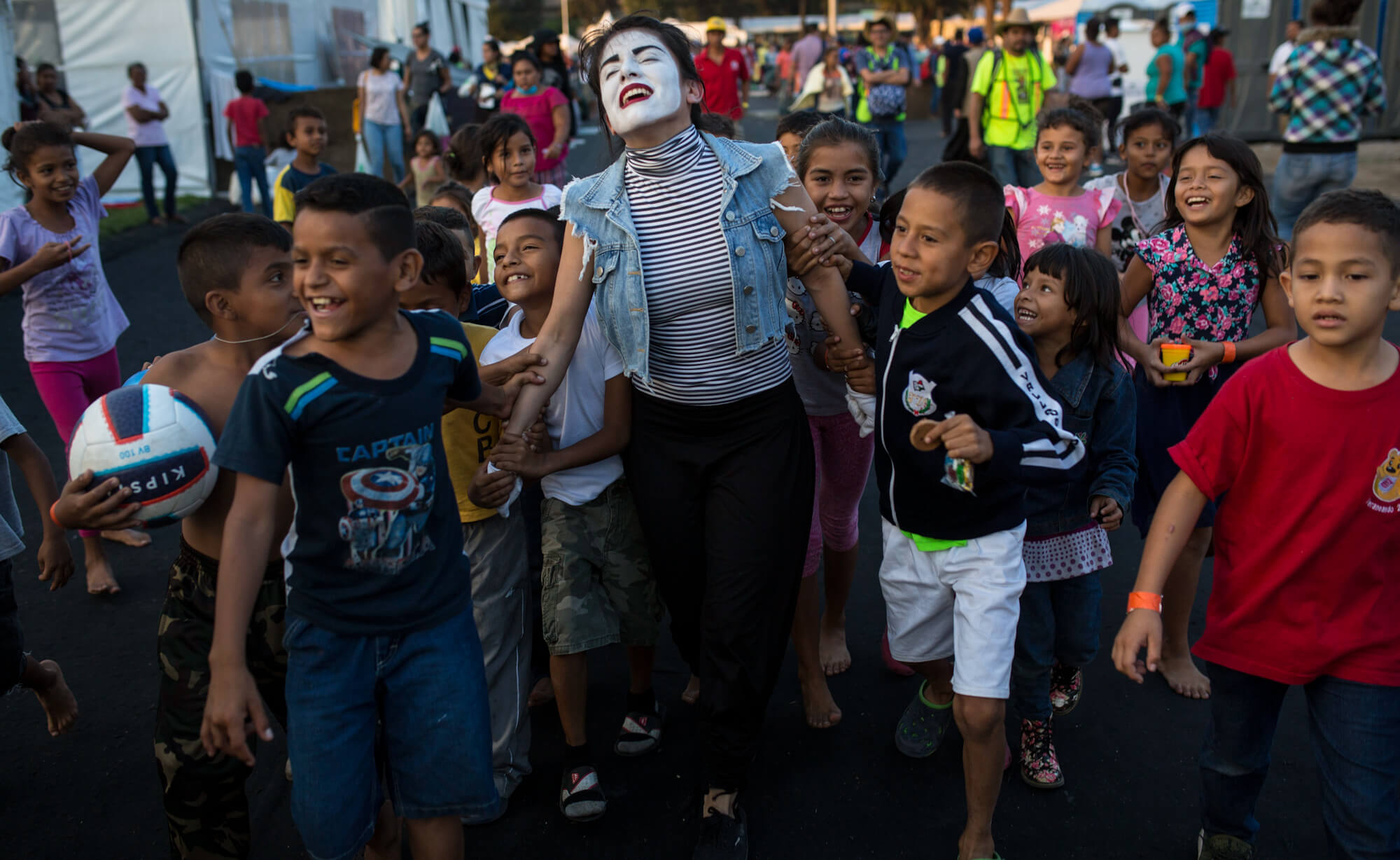
Belay had encountered refugee encampments and caravans at other stages of his life, but was surprised by the contrasts he saw in the football stadium – where one could simultaneously witness vast poverty as well as the broad smiles of enthusiastic people who remain strong despite the grim odds they face in their journey to the U.S. Belay explained:
One of the purposes of our visit has been to assess the legal, medical and basic needs of the community … I was really impressed by the strength and hope that the caravan has. They have traveled thousands of miles to protect their families and kids but they are still strong.”
The experience was also really sad for me. I have seen caravans before, but this was new for me because I saw so many displaced people who were both tired and happy, and that really touched me in my heart but these people are very strong, with great spirits. They are very disciplined and that gives me hope.”
For many IMA members, the encounter with the caravan hit close to home and touched on a universally-shared experience faced by those who are forced to leave their homes for the sake of survival.
Such was the case for IMA chairperson Eni Lestari, a domestic worker in Hong Kong who migrated from Indonesia. Lestari told MintPress News that the alliance was able to quickly raise $6,000 in coordination with local grassroots and civil society organizations in order to purchase an impressive array of goods to donate directly to the encampment.
Lestari explained:
We spoke to several groups of children, women, men, teenagers. We actually tried to ask them why many of them are coming from Honduras. Mothers of five, mothers of three, they left because they cannot come up with the economic needs anymore – they are being taxed so heavily by the gangs, the government gives them no protection, they are worried about the future of their children.
Actually, for the women, the only reason why they left Honduras is because of their children. They think if they cross the border they will have a better life – not for themselves, but for their children – which is a very common story for migrants across the world. There are 260 million migrants [worldwide] and this is the same type of story everyone is saying.
The men are looking for jobs, they have been trying to work but fail – they only get two months, three months, a few weeks and then they are fired – there are no jobs and even if they get a job, the pay is not enough. So many of the young men expressed their intention to look for jobs overseas – some even want to go to Spain, to Canada! They do not know how, the only thing in their mind is that if they can reach the Mexico-U.S. border they can pass through it and find a way to go.
I can see how desperate they are and I feel very disheartened. This is the case that even I experienced – we left our countries simply because of poverty, hunger, no money for education and we are thinking of our children.
Our message to them is that we understand their decision, whatever people say about them – whether it is good or bad – if they believe in their decision, they should pursue it. For us, we will make sure that we will stand by and make sure that no one is going to harm them and we will condemn the U.S. government for preventing them or even harming them just for the sake of their (fight) for survival.”
Systemic change, not charity, is the only way to address the crisis
Mass movement participants assisting the caravan see clear indicators of hope and potential amid the contradictory factors represented by the caravan and its complicated blend of impoverishment and optimism, grief and elation, misery and hope, listlessness and energy.
“People have been holding nightly assemblies. They love their countries, they love their homes, [but] they have no choice but to make this trek through unknown territories in the hopes of finding something better,” Franks said.
“Spending time and witnessing that, we can only do much as outsiders and don’t want to interfere with the basic form of organization the community has established,” he added.
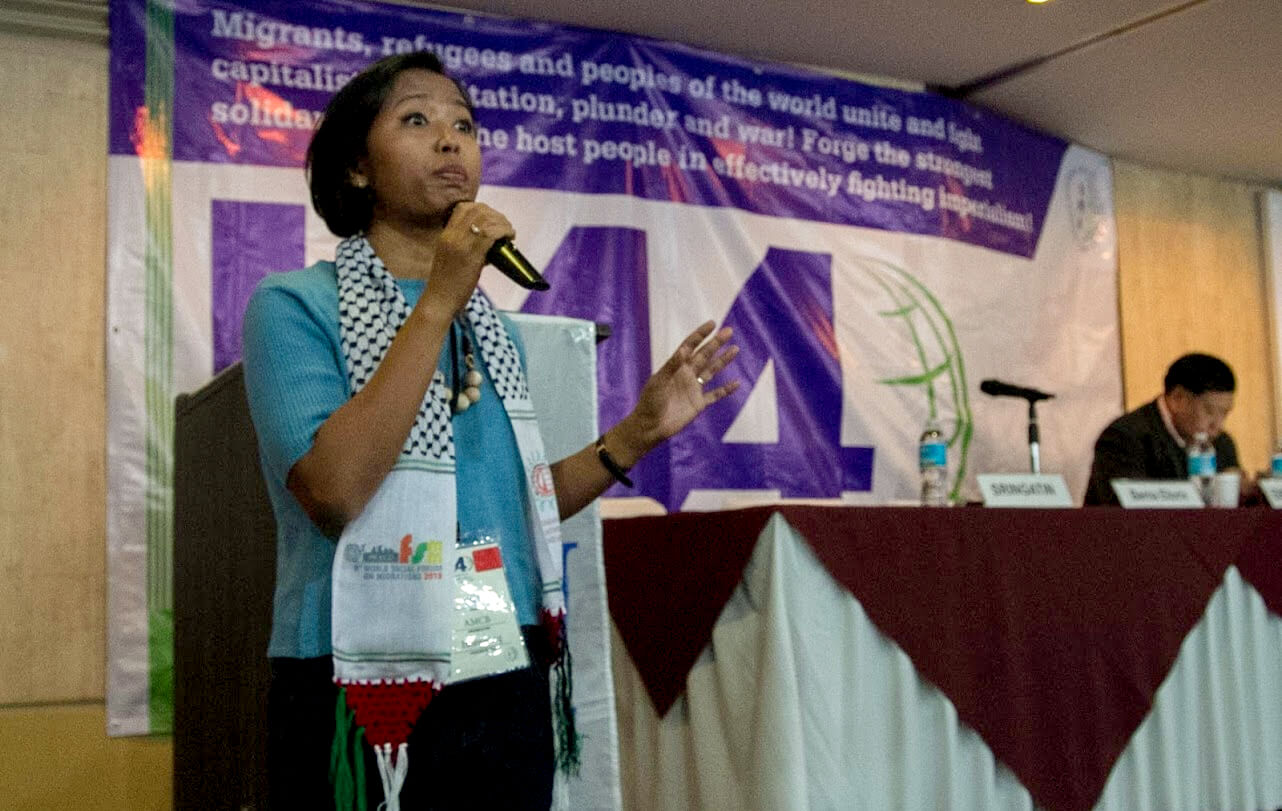
Lestari explained that while providing aid and raising funds is important, it can only be one part of a holistic approach – a tactic that serves the broader strategic goal of liberating people from the global system that propels these exoduses and migrant crises.
We have, in our advocacy and in our campaigns, two approaches: short term and long term. In the short term what they need to address are their urgent needs: housing, livelihood, school, anything that would address their human needs, human rights. IMA will make sure that the governments will respect their basic human rights, including pressuring the United Nations, the I.L.O. to raise up their voice to make sure they will get what they need.
But in the long run, we understand completely that all of us – including Honduras, Latinos, Asia, Africa, Caribbean – we are all victims of how unfair the system today is, because the very rich countries like the U.S., Canada, Germany invest in our countries through the transnational corporations [and are] taking away our resources, plundering our land, killing our people and indigenous leaders, and they are displacing us! And that’s why, generation by generation, what we see is not even development! So if they are selling to us that they are developing the world [and] we tell them: this is a lie. The thousands of people who are joining the caravan are living proof that their so-called ‘development’ doesn’t work. What they are doing is actually harming rather than developing.
So although we know that this is a very sad and bleak era in our time, IMA sees the other side of the coin: there are more people that are aware that they have to fight for their rights, for their land, for their resources, if they want to stay in dignity. And so in that case, people’s mobilizations like the caravan are something that I hope aren’t only an exodus but are more organized and then they will be more united.
But in the long-run what we want to see is system change. There is no other way! They cannot just stay in the United States, someday they have to go back to Honduras. By that time, the system must reform.”
Mass movement organizers insist that it remains important to maintain hope amid the crisis, with the caveat that this hope can only be found in the ongoing project of the people organizing themselves and escalating their resistance to the inhumane and profit-driven system at the root of forced migration. IMA hopes to advance that project through consolidating their alliance among afflicted communities so that immigrants no longer see themselves as helpless victims, but as a powerful force capable of permanently reversing the tide of displacement, trafficking, exploitation and abuse.
“There are a lot of stories of grief, sadness, and tragedy when you look at the situation of migrants, refugees and displaced peoples, but what is positive and delivers hope in the midst of this is resistance and movement-building,” Ellorin explained.
We are living in a time of great sadness but we’re also living in a time of great resistance of peoples and sometimes, the struggle for freedom is the next best thing to being free.”
Top Photo | Jose Pedro Rosales Fernandez, 18, from Progreso, Honduras, holds his four-month-old son Dariel, inside the sports complex where thousands of migrants have been camped out for several days in Mexico City, Nov. 9, 2018. Rebecca Blackwell | AP
Elliott Gabriel is a former staff writer for teleSUR English and a MintPress News contributor based in Quito, Ecuador. He has taken extensive part in advocacy and organizing in the pro-labor, migrant justice and police accountability movements of Southern California and the state’s Central Coast.


